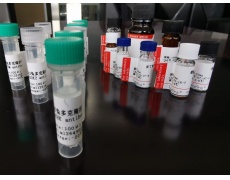中文名称:AMIGO2 抗原(重组蛋白)
英文名称: AMIGO2 Antigen (Recombinant Protein)
别 名: adhesion molecule with Ig-like domain 2; ALI1; DEGA; AMIGO-2
储 存: 冷冻(-20℃)
相关类别: 抗原
概 述:
|
Fusion protein corresponding to a region derived from 420-522 amino acids of human AMIGO2 |
|
Full name: |
adhesion molecule with Ig-like domain 2 |
|
Synonyms: |
ALI1; DEGA; AMIGO-2 |
|
Swissprot: |
Q86SJ2 |
|
Gene Accession: |
BC047595 |
|
Purity: |
>85%, as determined by Coomassie blue stained SDS-PAGE |
|
Expression system: |
Escherichia coli |
|
Tags: |
His tag C-Terminus, GST tag N-Terminus |
|
Background: |
The amphoterin-induced gene and ORF (AMIGO) family of proteins consists of AMIGO-1, AMIGO-2 and AMIGO-3. All three members are single pass type I membrane proteins that contain several leucine-rich repeats, one IgG domain, and a transmembrane domain. The AMIGO proteins are specifically expressed on fiber tracts of neuronal tissues and participate in their formation. The AMIGO proteins can form complexes with each other, but can also bind itself. AMIGO-1, also designated Alivin-2, promotes growth and fasciculation of neurites and plays a role in myelination and fasciculation of developing neural axons. In cerebellar neurons, AMIGO-2 (Alivin-1) is crucial for depolarization-dependent survival. Similar to AMIGO-1 and AMIGO-2, AMIGO-3 (Alivin-3) plays a role in homophilic and/or heterophilic cell-cell interaction and signal transduction |
 购物车
购物车 帮助
帮助
 021-54845833/15800441009
021-54845833/15800441009
